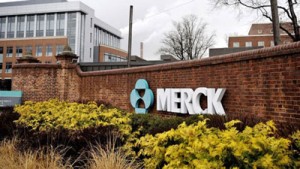Treatment of advanced NSCLC with KEYTRUDA presented at AACR Annual Meeting
Posted: 20 April 2015 |
New data from a Phase 1b study evaluating KEYTRUDA, in naïve and previously-treated patients with advanced NSCLC was presented at AACR 2015…


Merck has announced new data from KEYNOTE-001, a Phase 1b study evaluating KEYTRUDA® (pembrolizumab), the Company’s anti-PD-1 therapy, in naïve and previously-treated patients with advanced non-small cell lung cancer (NSCLC).


In an analysis of 313 patients from a validation data set for tumour PD-L1 expression, overall-response rate (ORR) was 45.4 percent (95% CI, 33.5-57.3) in patients with greater than or equal to (≥) 50 percent of tumour cells positive for PD-L1 expression (n=73). In the other PD-L1 subgroups, ORR was 16.5 percent (95% CI, 9.9-25.1) in patients with 1-49 percent tumour cells positive (n=103) and 10.7 percent (95% CI, 2.3-28.2) in patients with less than 1 percent tumour cells positive (n=28) for PD-L1 expression. In the total study population, ORR was 19.4 percent (95% CI, 16.0-23.2) (n=495), which was consistent with data previously presented from this study.
These data from KEYNOTE-001 were presented at the American Association for Cancer Research (AACR) Annual Meeting and were also published in the New England Journal of Medicine.
The efficacy findings demonstrated that tumour PD-L1 expression may be a relevant biomarker for the identification of NSCLC patients with an enhanced likelihood of experiencing improved efficacy with an anti-PD-1 therapy. PD-L1 is a protein that may be overexpressed in the tumour and may contribute mechanistically to an inhibited immune response.
NSCLC patients whose tumours express PD-L1 in the majority of their cells experienced the highest response rates to KEYTRUDA
“In this study, NSCLC patients whose tumours express PD-L1 in the majority of their cells experienced the highest response rates to KEYTRUDA treatment,” said Dr Roger Perlmutter, president, Merck Research Laboratories. “The results from this study formed the basis for our Breakthrough Therapy designation and our recent FDA submission for advanced NSCLC, and indicate that tumour PD-L1 expression may be a relevant biomarker to identify patients more likely to have higher rates of response to KEYTRUDA in this tumour type.”
Merck recently announced that the company submitted a supplemental Biologics License Application (sBLA) for KEYTRUDA in advanced NSCLC with the U.S. Food and Drug Administration (FDA). (link) KEYTRUDA was granted Breakthrough Therapy designation in advanced NSCLC by the U.S Food and Drug Administration (FDA) in October 2014.



